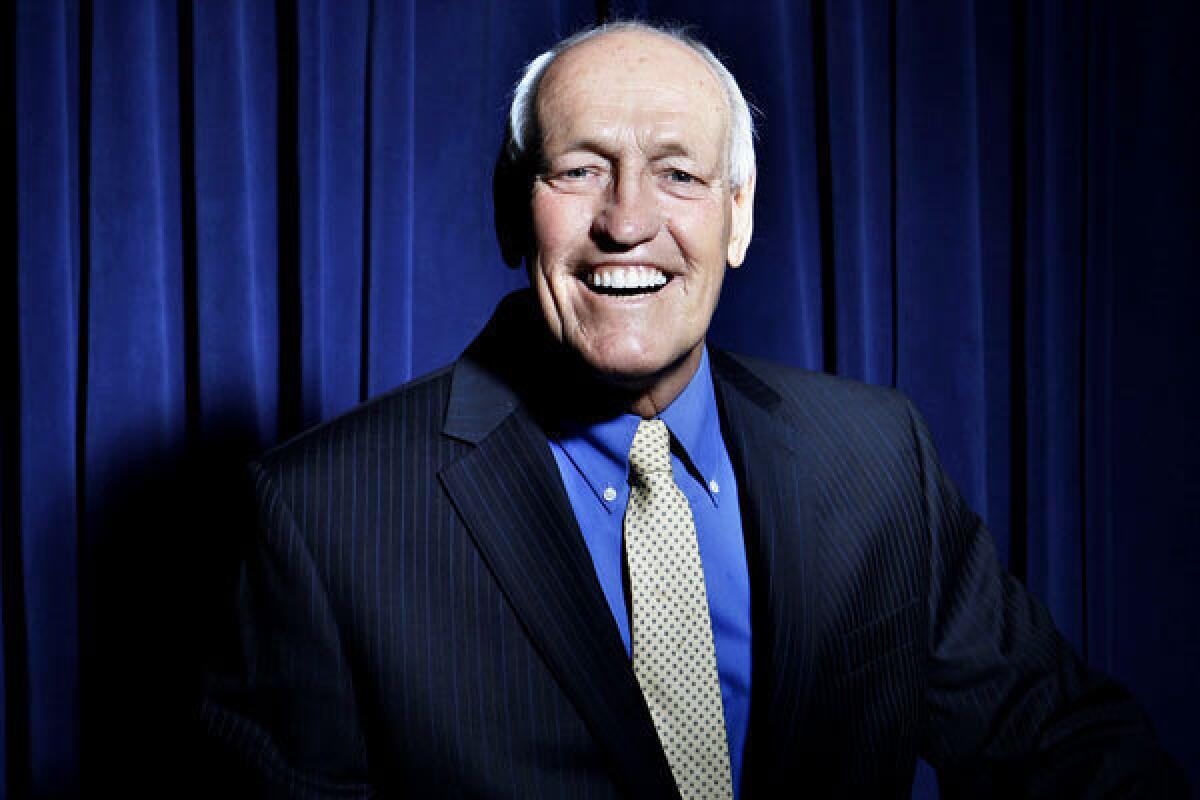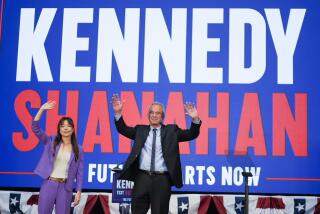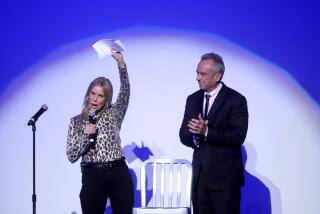Bill Rosendahl, happy warrior

Robert Kennedy was a young Bill Rosendahl’s hope for the White House, but Kennedy’s rival, Hubert Humphrey, practiced the “happy warrior” style of politics that represents the principles Rosendahl has embraced. As he leaves the Los Angeles City Council after two terms, his eight years in office (and a diagnosis of cancer, now in remission) have not extinguished Rosendahl’s cheerfulness, but they have given his warrior side an instruction booklet.
He’s crusaded for gay rights, for better care for the homeless and his fellow veterans, for mass transit. The archive of his previous career as TV host and executive (3,500-plus public affairs shows) goes to Loyola Marymount University. And whither Rosendahl? In an interview shortly before Tuesday’s election, he said he preferred someplace where he can explain government to people, and vice versa.
How has being on the City Council changed you?
You must be more patient. You must listen more. If you actually hear what’s being said, you may change your position. These dumb fake journalists say, “He flip-flopped.” He didn’t flip-flop. You learn new things that you might not have known.
I [also] worked for Bobby Kennedy; I was a White House appointee to the State Department; I was drafted into the Army and was a psychiatric social worker there. Those experiences leave marks that are helpful to you going forward.
Do you listen during public comments at council meetings? Some of your colleagues seem rather less than riveted.
I listen. Some of the gadfly business is a bit over the top, some of the rudeness, but I believe in public expression. I don’t think John Walsh [a regular gadfly] is wrong when he wants to know how much public money we’ve put out for [crime] rewards. What I’d love to say is, look, the reason we put the money up is so the damn media cover it.
You’ve been a broadcaster; you’re not happy with how local TV news covers politics.
People don’t know who their Assembly members are, their members of Congress. The media give these people no play, and the average constituent doesn’t understand which levels of government are responsible for what. [We have] irresponsible, sound-bite journalism: “If it bleeds it leads,” a commercial break, then five or six or eight seconds of Rosendahl. I’d be in Vons or Ralphs and people would come up and say, “I just saw you on TV.” I’d say, “what was I talking about?” And they’d say, “I don’t know, but you looked great.” Local TV doesn’t do what it’s supposed to do. News should not be about ratings and making money; it should be about informing and educating.
You’re not termed out, you’re retiring. What about term limits?
People get elected and reelected and reelected again because there’s no legitimate opportunity for a real campaign, because there’s no real journalism. Every voter should see all of the issues about all of the candidates. Term limits is the way they throw people out [in the absence of real campaigns]. It’s a negative strategy. Experience is worth something.
What could you do in politics that you couldn’t do in broadcasting?
The joy in politics is representing 275,000 people, with no hidden agenda. Everybody knows nobody owns Rosendahl. And Rosendahl asks what, when, where and why, tries to figure it out, listens to people to make the right decision. You have to do your homework. I love people, and if we love our neighbor as ourselves, we’re living in the spirit. A councilman is a shepherd of the land.
People say you burned bridges when your retirement was announced and you then criticized Presidents Clinton and Obama, Sen. Dianne Feinstein and others at a council meeting, on homeless and gay issues, drug wars and overseas wars.
I wasn’t burning any bridges! Clinton made a joke out of inhaling, yet billions get spent on incarcerating [drug offenders]. On gay rights, Clinton put in “don’t ask, don’t tell.” How dare he do that to me? I was in the military. He wants me to lie? Obama talked the talk but he didn’t walk the walk [on] the war on terror.
Does being a Democrat make a difference in city politics?
I don’t believe in ideology. I’m a Democrat who’s independent because the party has changed. I watched them move to the right and not stand for progressive principles.
Potholes have no politics. And neither does homelessness. Issues have solutions that need resources. The most frustrating part for me is not having the resources to do all that needs to be done. It’s a disgrace to be the richest country on Earth and have homeless people. When I cut the ribbon on transitional housing for veterans, the immediate neighbors went hysterical. A year later, a [neighbor] came up to me and said, “I brought them cookies and one of them gave me a painting he had made.”You have to get people out of fear and ignorance.
Did your political life change after you came out as gay?
[If] people can’t handle it, it’s their problem. I came out when I was 32 to my family. Then in 1995, when Christopher Lee Blauman [his partner] died, I told my public I was gay. All the fear about being public, that nasty people would come after me — and they did — I wasn’t embarrassed. Everybody [who mattered already] knew.
In 2008, you were instrumental in getting the transit tax, Measure R, passed.
I almost delayed the Expo Line by saying it should go down Venice Boulevard to Venice Beach, where we have 13 to 16 million [tourists] a year. My friend [former state Sen.] Sheila Kuehl told me that talking about it would delay it for another two years. So I said I’d compromise, but I want a link down Venice Boulevard someday so people on the Eastside don’t have to go to Santa Monica, a high-end, gold-plated community, but can come to Venice Beach.
You represent the airport area. How do we fix LAX?
Simple: regionalism. The Ontario airport is the solution to these jumbo jets, not destroying Westchester. Metrolink is just a half-mile away [from Ontario airport] and [it’s] 59 miles to downtown. At LAX, I envision the Crenshaw Line and Green Line [taking people] to a central terminal for a people-mover going all around [the airport], and to get on the trains to get downtown.
You use medical marijuana for cancer pain, yet you’re backing a ballot measure to limit medical marijuana outlets in L.A.
Voters will make that decision in the May runoff. The whole thing [in L.A.] is a disaster right now. If there was real leadership in Washington, they would legalize marijuana, period. It’s not a war on drugs; it’s a war on people. Marijuana has issues but not as debilitating as alcohol or prescription drugs.
You want L.A. to suspend its sister city relationship with St. Petersburg, Russia, over ianti-gay laws. Do council declarations about matters thousands of miles away really matter?
Yes, they do. L.A. is a microcosm of the planet, so it resonates throughout the whole world.
You’ve fought in the billboard wars. Digital billboard owners say they’ll sue for $100 million if the city takes the signs down.
We should [at least] be getting money off every one of those digital billboards, and I mean millions of dollars. They’re right there in your eyes, and what do we get? Zippo. Nada. I hope my colleagues will fight for our share of the money from billboards that are a blight to many of us, and hazards while we’re driving.
Why aren’t people in L.A. more engaged with city government?
People in my district take more part in issues in this city than the rest of the country. They come to meetings. They call me 24/7. Everybody has access to my cell number, from the homeless to the billionaires. And I take that very seriously.
What kind of realpolitik does it take to make city policy work?
Clinton said that politics is a combat sport. It’s tough. It’s rough. We rely on trusting each other and working with each other because we’re in a battle all the time. Good leadership can make things happen, the way we’re seeing with Herb Wesson.
I’ve told all my colleagues, use neighborhood councils — they’re good. Look what Venice did the other day: 1,622 people voted in a neighborhood council meeting. I love the democracy.
What don’t non-Angelenos ‘get’ about L.A.?
They don’t get the megalopolis feeling of people from all over the world. They don’t get the interconnection. Second — the warmth, the sun. That’s why I’m big on solar energy. I just opened up a private-public solar carwash. We should all have a solar panel on our roofs.
Do you?
I don’t yet because of trying not to get in the middle of “Rosendahl [bought] this or that” [brand].
By the time this is published, you’ll know if your choice for your council seat, Mike Bonin, is in the May election. But you’ll still have 12 weeks in office. What’s important to change?
Pension and healthcare reform. I came from the private sector. I know what it’s like in the real world. I know how capitalism functions, and I know how workers have to be taken care of, because if you don’t take care of your workers, what good are you?
Follow Patt Morrison on Twitter @pattmlatimes
This interview was edited and excerpted from a taped transcript. An archive of Morrison’s interviews can be found at latimes.com/pattasks.
More to Read
A cure for the common opinion
Get thought-provoking perspectives with our weekly newsletter.
You may occasionally receive promotional content from the Los Angeles Times.







